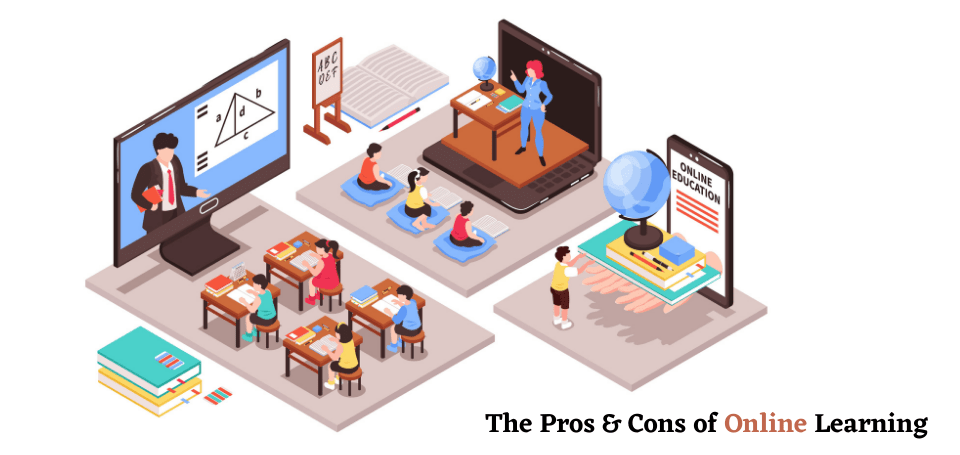One of the most frequently used terms after the pandemic is the term “new normal.” The new normal in education is the increased use of online learning. The COVID-19 pandemic has set off better ways of learning. Educational institutions are looking toward online learning platforms to continue with the concept of educating students. The new normal now is a transformed concept of education, with online learning at the core of this transformation. Today, digital learning has emerged as a fundamental resource for students and schools. For many educational institutes, this is a totally new way of teaching that they have to implement. Online learning is currently applicable not just to learning academics, but it also stretches out to learning extracurricular activities for students too. In recent times, the demand for online learning has risen significantly, and it will continue doing so in the future.
Similarly, as with most teaching strategies, online learning also has its own pros and cons. Decoding and understanding these pros and cons will help institutions create strategies for delivering the lessons more efficiently, guaranteeing a continuous learning journey for students.
Pros Of Online Learning?
- Efficiency
Online learning offers tutors an effective way of delivering lessons to students. Online learning has multiple tools like videos, PDFs, and podcasts, and tutors can use all of these tools as a part of their lesson plans. By broadening the lesson plan past traditional text books to include online resources, tutors can be more efficient teachers.
- Accessibility Of Time And Place
One more advantage of online schooling is that it allows students to attend classes from any place of their choice. It also allows schools to reach out to a more extensive network of students, rather than being restricted by geographical boundaries. Also, online lectures can be recorded, documented, and shared for future reference. This allows students to access the learning material at their most comfortable time.
Thus, online learning offers students the accessibility of time and place.
- Affordability
Another advantage of online learning is reduced financial costs. Online education is far more affordable when compared with physical learning. This is because online learning eliminates the expense points of student transportation, student meals, and, above all, space. Also, all the course or study materials are available online, thus creating a paperless learning environment that is more reasonable while also being advantageous to the environment.
- Improved Student Attendance
Since online classes can be taken from home or any place of your choice, there is less possibility of students missing lessons.
- It Suits A Variety of Learning Styles.
Each student has a unique learning journey and a unique learning style. Some students are visual, while others prefer to learn through audio. Also, a few students thrive in the classroom, and other students are solo learners who get distracted by large groups.
The online learning system, with its range of options and resources, can be customized in numerous ways. It is the best way to create a perfect learning environment suited to the requirements of every student.
Cons Of Online Learning?
- Inability to Concentrate on Screens
For some students, one of the greatest challenges of online learning is the battle with focusing on the screen for a long time. With online learning, there is also a greater chance for students to be easily distracted by social media or other websites. Therefore, the tutors must keep their online classes crisp, engaging, and interactive to help students focus on the lesson.
- Technology Issues
One more key challenge of online courses is internet connectivity. While internet penetration has increased quickly in leaps and bounds in recent years, in smaller cities and towns, a consistent connection with good speed is an issue. There may be a lack of continuity in learning for the child if students or tutors do not maintain a consistent connection. This is detrimental to the education system.
- A Sense of Isolation
Students can learn a lot of useful knowledge from being in the company of their peers. However, in an online class, there are minimal physical interactions between students and tutors. This frequently leads to a feeling of isolation for the students. In the present situation, it is imperative that the school allow for another form of correspondence between the students, peers, and tutors. This can include online messages, emails, and video conferencing that will allow face-to-face interaction and reduce the feeling of isolation.
- Teacher Training
Online learning requires tutors to have a fundamental understanding of using digital forms of learning. However, this isn’t the case generally. Frequently, tutors have a basic understanding of technology. Sometimes, they don’t have the basic resources and tools to conduct online classes.
To combat this, schools should invest in training tutors with the latest technologies so they can conduct online classes seamlessly.
- Manage Screen Time
Many parents are worried about the health risks of having their children spend long periods watching a screen. This increase in screen time is probably the greatest concern and disadvantage of online learning. Sometimes students also develop bad posture and other physical issues due to remaining hunched over a screen.
Final Words
The reality is that there are pros and cons to each kind of learning environment.
Students need to analyze both the advantages and disadvantages, which contribute enormously to making an informed decision about the direction of his/her career path. Students need to choose how they will achieve their objectives: online, in the classroom, or a mix of both.
However, in some situations, the inconvenience of maintaining a steady school plan restricts potential students from furthering their schooling. It is also a fact that learning is exceptionally dependent on an individual’s motivation to learn. So, in the end, how much effort a student puts into his or her education determines how much he or she retains and how valuable the overall experience was to his or her future career.
Thanks
Vikas The Concept School | +91 7702900900 | www.vikasconcept.com
Read More














